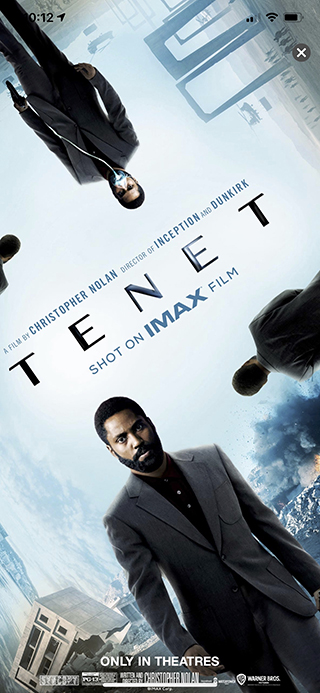Movies

New Releases • A-D • E-H • I-P • Q-Z • Articles • Festivals • Interviews • Dark Knight • Indiana Jones • MCU
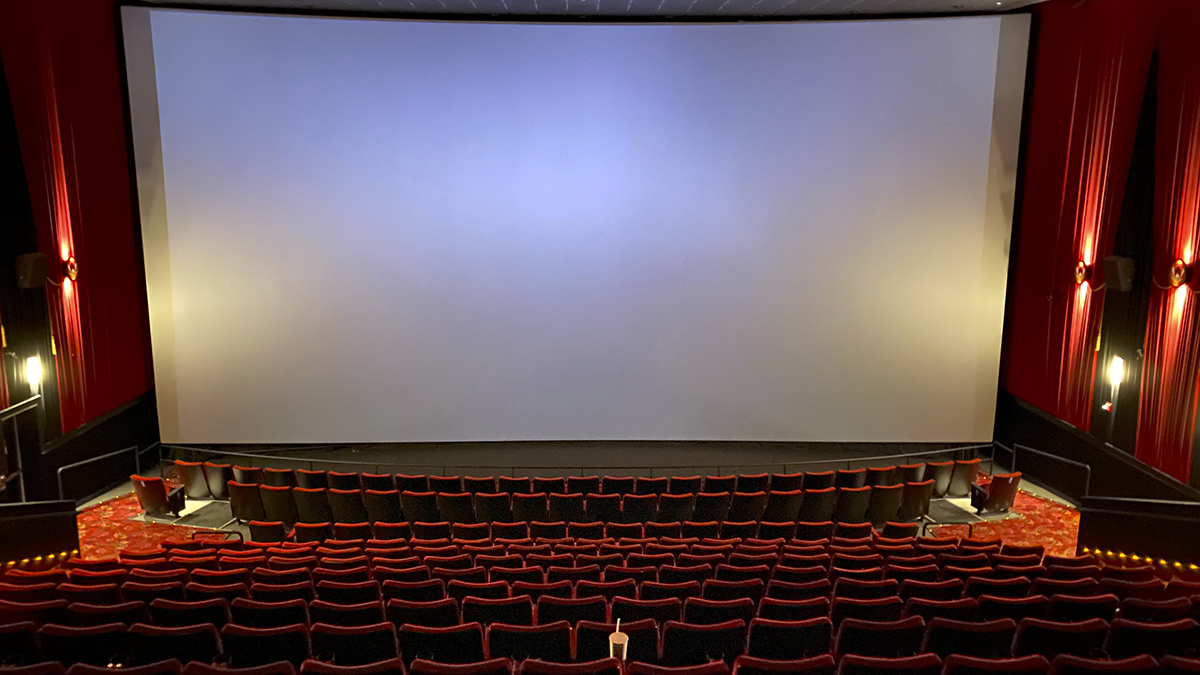
A large soda (Coke Lime) sits in the AMC Arapahoe Crossing Auditorium 1 (IMAX)
Photo taken on the iPhone 11 Pro Max
Rewriting Movie History
Movie Theatres Look for an Alternate Opening
Analyzed 11 October 2020
Updated 7 November 2020
Turns out reopening U.S. movie theatres in August — in the midst of the COVID pandemic — needed a little more pre-production planning.
A New Hope Lost
The nation’s two largest chains, AMC and Regal, reopened theatres on 21 August, but only seven weeks later, on 9 October, Regal had once again shuttered.
What happened?
Some businesses have adapted while others have struggled. Some local restaurants are thriving — possibly because nearby offerings are sticking to very limited hours of operation. Health clubs reopened in July and have managed to scale back at least some of their restrictions; timed reservations for workouts are no longer required, but the saunas and whirlpools remain closed.
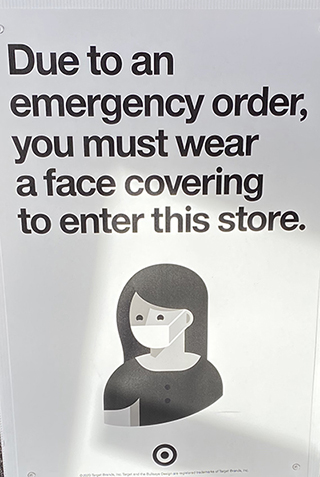
Face masks are not enforced at Target, despite
the posters
Then there’s Target. Sure, put a poster at the entrance saying masks are required. Trouble is, Target doesn’t enforce it because they don’t want any trouble. The result: it lets customers roam freely without masks. I know. I put up a stink about a maskless couple inconsiderately waltzing around the store maskless. Target store management told me they don’t want any “scenes.” “Bullseye,” Target. That’s the whole point of requiring face coverings in the first place. Geniuses afoot.
With movie theatres, things need to put in their proper perspective. Indoor environments can be hotbeds for the virus. Wearing masks while working out for 30 or 45 minutes is one thing; removing masks while taking in some food and a beer with distanced spacing between customers is one thing. Shopping? Put up a fuss then move to a different part of the store. But, when it comes to movies, there’s more of a commitment. Tenet, for example, is 2 1/2 hours, add in trailers and other programming and the time stretches out closer to 3 hours. Certainly that weighs on some people more than others, even with reserved seating systems that automatically block out neighboring seats during the ticket selection process.
In retrospect, it’s easy now to say some expectations were out of whack back in August, especially considering only around 70% of theatres have reopened (New York and California being two key markets with theatres — at least in some counties — still closed; internationally, other huge markets, including India, have yet to reopen theatres). Of those open, capacity per auditorium has been limited to anywhere from a scant 15% to around 50%.
In this business environment, what has been considered a traditional blockbuster is simply impossible.
Even Marvel proved powerless to solve the problem with the release of The New Mutants back in August.
The reopening has been strained by those capacity limitations, and nearly crippled by the lack of new offerings. An array of recent “classics” have filled the marquees.
All of it is problematic. In this era of 4K OLED, surround sound bars and the effortless ease of streaming movies, bringing Minions back to the big screen isn’t going to draw the crowds. To that end, Christopher Nolan’s turned to IMAX as a tool in providing the definitive modern-day theatrical experience and Tenet — originally set for a July global release — was the first big-budget production to test the waters in this COVID environment. Under the circumstances, it’s performed fairly well, but certainly not at the levls it could have were it not for COVID.
Finger-pointing and second-guessing have made headlines in the trades as theatres are underperforming against expectations and the studios continue to shuffle release schedules. October looked promising with Wonder Woman 1984 and Death on the Nile, but they were both pushed to December. November looked hopeful with No Time to Die until it was once again pushed out, this time to April 2021.
That was the final blow for Regal. With its U.K.-based parent company struggling with local restrictions and the limited market capacity in the U.S., things were too grim. Relying on Tenet, a string of mediocre new releases and a slew of catalog titles wasn’t going to be enough to cover operating costs.
The picture keeps getting darker. Now Pixar's Soul is skipping theatres (at least in the U.S.) and going straight to Disney+ as a Christmas offering.
There is one bright spot. Ironically, it’s right where the whole problem started to begin with. At least one Chinese domestic release has opened to record box office, The Eight Hundred.
Back to Back to the Future
The lineup of modern “classics” isn’t particularly rousing. Bridesmaids, The Land Before Time, Magic Mike, Trainwreck? Snore.
Again trying to give the theatrical experience its due, Nolan’s Inception at least got a new digital master and a new pre-movie featurette commemorating the movie’s 10th anniversary (throwing in a behind-the-scenes featurette for Tenet was a nice, wholly appropriate touch).
On the other hand, The Empire Strikes Back marked its 40th anniversary and was basically dumped in theatres with a key ingredient missing: Disney’s marketing savvy.
Aside from those few new releases that received theatrical distribution, the studios have put very little marketing muscle into support of the reopening. The bulk of the work has seemed to rely on the theatrical chains’ own marketing systems, with the rebuilding of customer relationships via their reward programs as a foundational component. The extent to which more casual moviegoers were/are even aware of the reopening hasn’t been fully examined yet.
Rear Window Crack’d
Theatres and studios need to look to the past not only for those catalog titles, but also for alternative distribution models.
There should be some lessons learned here, coupled with some tips that movie history could teach.
For example, Disney used to put a moratorium on movies, particularly their animated classics, and rereleased them in theatres every seven years. It was a generational introduction to Disney and movie theatres. Even home video releases were carefully metered, with titles being made available for purchase for a limited time.
Of course, as home technologies have evolved, that rhythm and that business model has been forced to adapt. However, one argument suggests the ever-shrinking window between theatrical and home releases is simply to save on marketing costs and to allow the home release to ride on the coattails of the recent theatrical marketing campaigns. Now some movies engage in both releases day-and-date; Fatima is one example, but that move was at least partly in response to COVID.
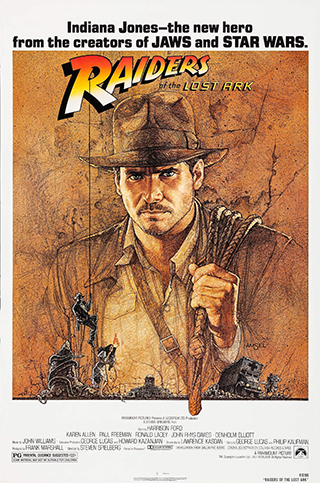
In that bygone era of moratoriums on film titles, the true blockbusters would play for more than a year during their initial run, then enjoy numerous rereleases. Some “special” movies required a little extra hands-on management, starting in those stalwart major coastal markets which featured national media outlets and nationally recognized film critics in order to generate buzz and a sense of anticipation driven by word of mouth. Those platform releases helped a movie build momentum without the stress of a single sink-or-swim opening weekend. The movie was nurtured and given time to find its audience in the flyover States. How ironic those coastal influencers are largely shuttered now while the fyovers struggle to reopen. A crossover discussion on the folly of a national popular vote won’t be attempted here. But the situation seems oddly foreshadowing of issues to come.
Internationally, release patterns were similarly staggered. For example, Raiders of the Lost Ark was released in 35 countries during the course of 13 months (between June 1981 and June 1982). In contrast, Indiana Jones and the Kingdom of the Crystal Skull was released in 60+ countries within two months (May and June 2008). That data’s supplied by IMDB and it’s accurate enough to make the point.
Ultimately, that old platform strategy was how Tenet was trying to steer through the global theatrical situation. Waiting for all theatres to reopen worldwide would be at the expense of so much more at the local level — considering in particular the employment and community aspects of theatres. The simultaneous global launch is a relatively new strategy and is driven largely in response to the economics of modern blockbusters where the big budgets keep getting bigger and bigger — it’s now being reported No Time to Die carries a remarkably bloated price tag of $300 million.
But, in this pandemic environment, a global release is impossible.
What to do? What to do?
Clue(less)
There are five parties directly involved, plus a sixth indirectly, each with a vital role in making the theatrical exhibition business model work.
- Filmmakers: need to create new feature films; production is starting to resume, as long as everybody does the unthinkable: play it safe
- Movie studios: need to distribute and market the — preferably new — content that will draw audiences
- Theatre owners: need to maintain a viable business while also accommodating current needs to provide a safe, clean environment in accordance with social distancing protocols
- Government: needs to keep moving forward with supporting businesses by developing guidelines that allow businesses to reopen in a more expeditious, but safe, manner
- Moviegoing public: follow social distancing guidelines, wear masks, be good citizens and take personal responsibility for bringing life back to the normal we all prefer
- Scientists: work on getting a vaccine out there that can finally tame the COVID-19 beast
Each one of those parties has a role and each one is exposed to a certain level of risk and a certain level of reward.
Christopher Nolan — and so many others — places a premium on the theatrical experience. Was it a mistake to release Tenet at the end of August? Absolutely not.
It was most certainly a gutsy thing to do. And it was the right thing to do. Here’s why.
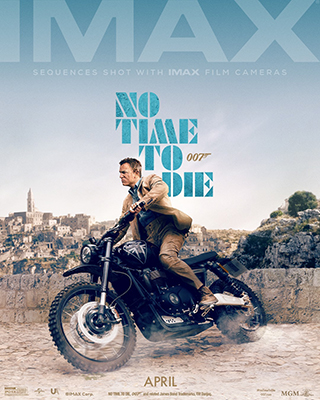
No Time to Die was originally set for global
release in April 2020
First, keep in mind, this is a global problem — it’s not U.S.-centric. A key catalyst to the reshuttering of theatres was a resurgence of Coronavirus cases in the U.K. That triggered the latest Bond release date push, which in turn toppled the cart. It was already going to be a long drought between now and mid-November, with several releases already pushed out to 2021, The King’s Man, Black Widow and now Dune are among them. Others are moving straight to streaming; Greenland’s trailer was a staple of coming attractions when theatres first reopened and it was going to hit the big screens on 25 September before wimping out and moving to PVOD later in the year, followed by a big push as a high profile streaming title on HBO Max in 2021.
Others have started to crowd around the holidays, with Free Guy, Death on the Nile and Wonder Woman 1984 claiming key Christmas dates. Still others pushed out from the holidays to next year’s Christmas season, as with Steven Spielberg's West Side Story. After months of tremors, the ground’s been cracking the past few weeks.
The economics have changed dramatically. Hopefully it’s a temporary change. The challenge is to get through the pandemic and ease back into a steady state; leveraging modified platform release models seems to be a wise path. Right now, it’s foolish to expect gold standard blockbuster box office results in this tumultuous global environment. And while it’s rational to want to wait for a larger audience to return to theatres, it’s in some respects a stance of limited vision and, ultimately, rather selfish. Nolan’s approach was taking a step to heal the business, to support the theatre owners who have been supportive of his work, even though not everyone could participate at the outset. Those closed markets would get a Tenet release when they’re ready to reopen — a new spin on the platform model; consider it the inverted model. There’s a huge swath of the country — and the world — in need of the economic bounce from new releases and that avenue has been stunningly mishandled.
It’s an undeniably sloppy time, but relying on a slate of nostalgia releases at discounted ticket prices isn’t the sole solution. It’s merely a logical part to a larger, more holistic plan.
The theatrical experience is a vital part of life as we know it. Put aside the economics for now. Movie theatres are a premium platform for skilled filmmakers to display their talents and share their stories in a community environment. Movies have always been a community experience. While 4K OLED screens are fantastic for home viewing, they can’t match the magnitude of IMAX. The opportunity for a shared audience experience is unparalleled, especially in this time of so much unrest on so many fronts and the dissolution of community by the very tools which in theory should be bolstering it (hello, social media — I called out the dangers of giving every Joe a megaphone years ago).
There have been online community screenings of concerts and movies, but the experience has been less than satisfactory. Streaming platforms are starting to support group viewing, facilitated in part by friends and family messaging each other during a shared streaming experience. But it’s not the same. It’s still insular, keeping people within their own groups and building an even more fragmented world of tiny silos.
Update: 7 November 2020
It’s all up to Wonder Woman now.
Every other major release has moved away from the Christmas season. This week, Free Guy (moved from July to 11 December), Death on the Nile (bumped from October to 18 December) and The Comeback Trail (originally set for November release then 18 December), have all been scrubbed from the schedule — and with no new dates announced. For now, Wonder Woman 1984 is holding onto its Christmas Day release, but it’s looking more and more doubtful the movie will hit screens this year.
This is all in response to lockdown measures being reinstated as Europe sees a major resurgence in the virus. And the U.S. isn’t faring much better as the weather gets colder. Going local, Denver’s instituting a 22:00 curfew for all non-essential activities until early December as one last ditch effort to avoid new stay at home orders.
It’s looking grim. And, from a certain point of view, it supports the argument for the platform release model. Release where possible, when possible. Sloppy and a little more expensive? Sure. But in an effort to try to offer some step toward normalcy where possible, it’d be a positive strategy. Instead, layoffs continue to rattle marketing and other functions at Disney, Lionsgate and elsewhere.
The one bright spot (relatively speaking) from the week: Tenet is headed to home video platforms on 15 December.
